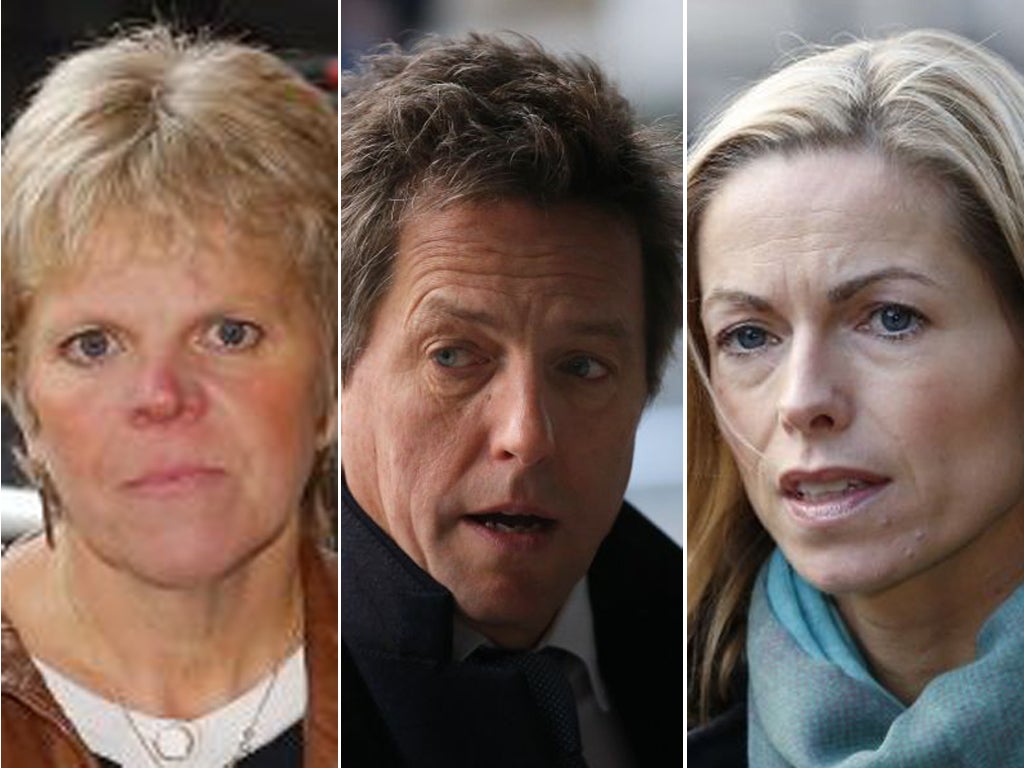
Your support helps us to tell the story
From reproductive rights to climate change to Big Tech, The Independent is on the ground when the story is developing. Whether it's investigating the financials of Elon Musk's pro-Trump PAC or producing our latest documentary, 'The A Word', which shines a light on the American women fighting for reproductive rights, we know how important it is to parse out the facts from the messaging.
At such a critical moment in US history, we need reporters on the ground. Your donation allows us to keep sending journalists to speak to both sides of the story.
The Independent is trusted by Americans across the entire political spectrum. And unlike many other quality news outlets, we choose not to lock Americans out of our reporting and analysis with paywalls. We believe quality journalism should be available to everyone, paid for by those who can afford it.
Your support makes all the difference.Victims of phone hacking and press intrusion this afternoon gave a cautious welcome to Lord Justice Leveson's report – but warned they would be holding politicians to account for implementing it in full.
While some would have liked the report to go further and propose a system of full statutory regulation on the press there was a recognition that Leveson had done more than many in the newspaper industry – and some in Government – would have liked.
Hacked Off, the group supported by many of the celebrity victims of phone hacking described the report as “reasonable and proportionate”.
“The Judge has rightly condemned the outrageous conduct of the press in the recent years,” they said.
“These proposals are reasonable and proportionate and we call on all parties to get together to implement them as soon as possible. The Inquiry is over. Now is the time for action.”
Former Formula 1 boss Max Mosley, who was the subject of a News Of The World sting suggesting that he had been involved in a “sick Nazi orgy”, said it would be “astonishing” if the Government did not implement Lord Justice Leveson's recommendations.
“It certainly is a very thorough document and it's in many respects better than one could have hoped,” he said.
“The only real omission is that if you want to stop something coming out because you find that they are going to breach your privacy, you would still have to go to court to do that, which of course is very expensive.”
David Sherborne, counsel for victims who gave evidence to the Inquiry, called the report “a weighty and impressive document”.
“The consensus is that we welcome the contents of the report, and in particular both the findings it contains and the recommendations that are proposed,” he said.
“In particular, there is a clear recognition of the wide-scale failings in the culture, ethics and standards of the press, and the devastating consequences this has had for the victims.
“In the face of compelling and often disturbing evidence, which my clients gave to the Inquiry, about their experiences at the hands of the press over the years, the need for a strong and independent regulator is frankly unarguable.”
He added: “Today it seems we have finally learned from the failings of the past, and it is time now to implement these judicial recommendations within a timeframe so that if the press fails to create this independent regulator, it must be this parliament which imposes a statutory system upon them.”
Dominic Crossley, who represented the families of Millie Dowler and Madeleine McCann during the inquiry, said: “They want a better and more responsible press because they recognise its value. They are just a small selection of the hundreds of other people who have been the victims of spears, bullies and attention.”
Shami Chakrabarti, director of the Civil liberties group Liberty - whose served as an assessor in the inquiry team - welcomed the principal recommendation of a more robust and independent press self-regulator, but said her organisation was unable to back the last-resort alternative of compulsory statutory regulation.
Ms Chakrabarti said: “Leveson's main proposal makes sense for the public, press and politicians alike.
“The press sets up a robust body - independent of Government and serving editors - and earns legal protections from needless challenges in court. The public gets confidence of greater access to justice and redress when things go wrong.
“What nobody needs and Liberty cannot support is any last-resort compulsory statutory press regulation - coming at too high a price in a free society.”
Head of the Press Complaints Commission (PCC) Lord Hunt, whose own plans for self-regulation were rejected by Lord Justice Leveson, said there now needed to be a “fresh start”.
“I do not want the message to go out from this country that the UK is bringing in a press law but we do have to make a fresh start with a new body and that is what I'm going to reveal,” he said.
“I did sense that Brian Leveson wants the press now to get on with it. He embraced a free press. What we have to make sure now is the press do not let him down. There is a huge opportunity here and we must seize it.”
But a less favourable response came from Andrew Neil, the former editor of the Sunday Times. He tweeted: “Leveson off to Oz. Is he replacing Mad Nad in the bush-tucker trials?.”